Researchers have concluded that the Tour de France may be an effective tool in stemming the rise of the far right in France.
France has had a problem with rural depopulation for decades, with the term diagonale du vide coined for the 42% of mainland France’s land area that houses only 6.5% of its population, and which stretches the length of the country from the north east to the south west. There are 13 départements out of 96 where more cows live than people.
Previous research pointed to the influence of factors such as economic stagnation, population decline and migration of younger people to urban areas, which result in 'left-behind places', where there’s a feeling of neglect and marginalisation. Automation, the decline of low-skilled jobs and immigration are also cited as factors.
This has been shown to result in voters turning away from mainstream political parties and a drift to the far right.
But researchers, in a study titled Cycling through Elections: The Political Consequences of the Tour de France, point to the effect of the Tour de France as a transient place-based intervention, which both increases economic activity when the Tour comes to town and changes perceptions of an area locally, nationally and internationally.
The Tour comes to town

The researchers found a strong negative correlation between the number of times a municipality had hosted the Tour de France and the far-right share of the vote across both French legislative and presidential elections.
Hosting a grand départ is expensive; the 2021 grand départ from Brest in Brittany cost around €1.5m, but the region estimated the direct local gain from tourist income and increased economic activity at around €4.35m.
“When the Tour comes to town the whole place goes crazy. For the five days or so during which the race is arriving, setting up, conducting medical checks, presenting the riders and of course holding the opening prologue TT and the start of stage one, the town belongs to the Tour…" commented one of the organisers of the 1990 Futuroscope grand départ.
According to the newspaper Le Figaro, towns pay ASO, which organises the Tour de France, between €60,000 and €80,000 for a stage start and €100,000 to €120,000 for a stage finish.
But the researchers point out that the economic benefits spread through the wider area, with hotels booked for teams and spectators, and increased spending in local stores, restaurants and more, lifting local GDP per capita.

There’s also the effect of the 10,000-plus towns and villages on the route having their brief moment of televised fame, with the TV motorbikes and helicopters overhead showing off the locality. The researchers found this increases pride in the locality, although places through which a stage passes don’t pay ASO.
"Seeing the town highlighted on a national and international scale strengthens the sense of belonging, with decorated streets, media presence, and a festive atmosphere," said one respondent to a survey carried out to support the research, while another commented that: "It looked like our town was actually important."
The researchers' analysis showed that even having the Tour pass through a municipality reduced the far right vote share marginally: by 0.33% in presidential and 0.44% in legislative elections. The effect was larger when a French cyclist won a stage.
They say their findings suggest that the 'left-behind' explanation of the increase in far-right voting fits better than the alternative theory that it’s driven by nationalism, ethnic prejudice and the perceived threat from immigration.
They conclude that even a brief spell in the Tour de France limelight can decrease the feeling of neglect and the tendency to vote for the far right, an effect that the study suggests lasts for several years at least.


